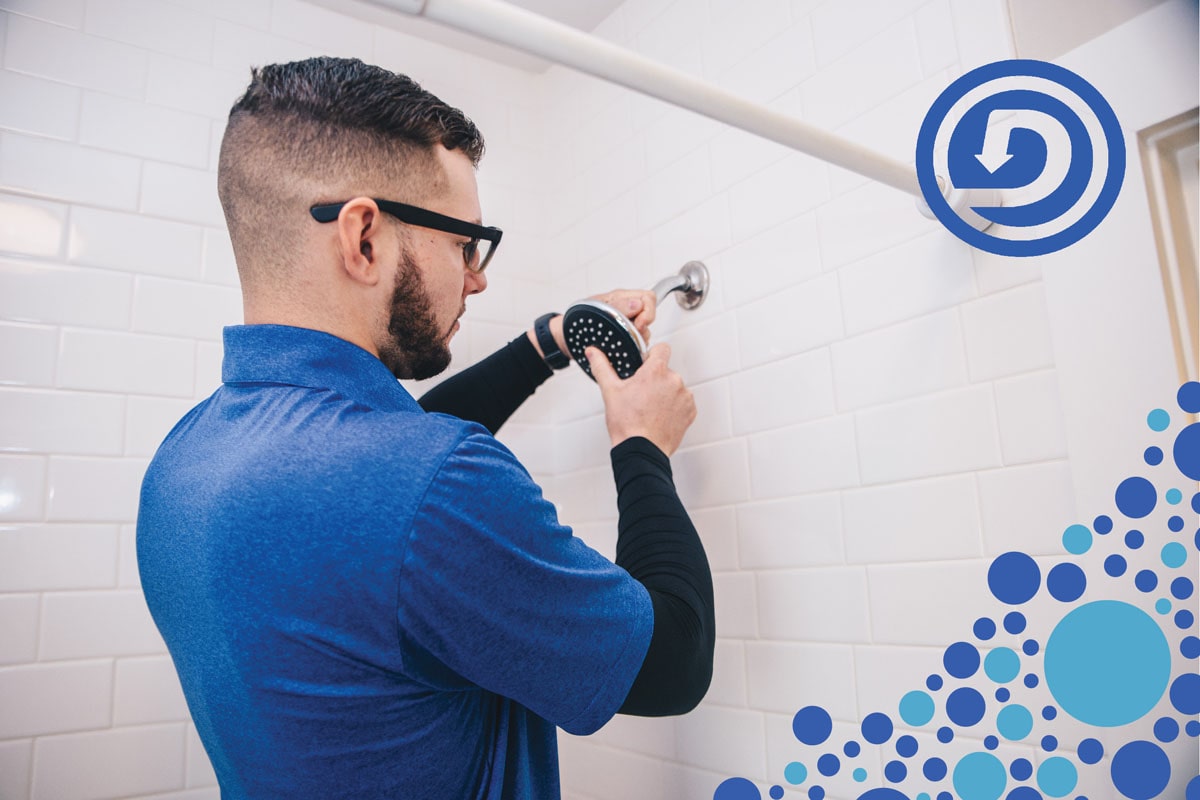
Dynamic Drains, a team of professionals dedicated to honest communication and high professionalism. Give us a call and we will examine the service area, plan out installation, deliver an upfront quote, and install a Water Filtration System for you. We have provided plumbing services to the Brazos Valley since 2014 and have a team of licensed and trained professionals you can trust to install a water filtration system in your home or business!
Dynamic Drains, a team of professionals dedicated to honest communication and high professionalism. Give us a call, we will…
- Examine the service area
- Plan out installation
- Deliver an upfront quote
- Install a Water Filtration System!
FAQ
If you are on municipal water or well water, a water filtration or conditioning system can provide you with consistent quality for your drinking water.
Although municipal water systems must meet a minimum standard for water quality, the taste of your water can still be negatively affected and damage can still be caused to plumbing fixtures over time. The same is true for well water, except it is up to the well owner to test and maintain the quality of the water.
Investing in a good water filtration or conditioning system can really help your plumbing system and fixtures last for many years as well as provide clean drinking water at every fixture.
For most municipal water systems, an activated carbon filtration system is the best option.
Municipal water must meet minimum standards to be considered drinkable, but that doesn’t mean it’s clean or that it won’t harm the plumbing system.
How might it damage the system? The common way for municipal water to be disinfected or sanitized is through the use of chlorine or chloramine (ammonia and chlorine mixture). These chemicals are added to the water at various points in the system in order to maintain the quality. Along with minerals or other contaminants in the water, these chemicals can cause damage to plumbing fixtures and cause premature failure.
Once the water has made it to your property, the disinfectant has done its job. A whole house granular activated carbon (GAC) filtration system can effectively remove this disinfectant at the point of entry, making the water quality similar to that of bottled water for every fixture. GAC is great for removing chlorine, chloramine, and VOCs (volatile organic compounds).
If your water hardness is over 7-10 grains per gallon, a water softener is recommended. Water softeners only remove hardness and they are considered water conditioning systems, not filtration systems, as they do not remove anything other than minerals. They can definitely help to maintain plumbing fixtures and tankless water heaters.
When it comes to well water, there is not one system that works best for all well systems.
We always recommend the water to be tested by a lab in order to determine what needs to be treated. It is common for untreated water from private well systems to have high levels of iron, minerals, viruses, and bacteria. If the water is determined to have some contaminant like E. coli or coliform, then it needs to be disinfected. This is why we always recommend having the water tested so that the right filtration system can be installed.
When dealing with viruses or bacteria, we recommend an Ultraviolet Filter (UV). These systems are much cleaner and equally effective at killing bacteria or viruses in the water versus a chlorinator. A chlorine system for disinfecting the water requires a means to add the chlorine and a staging tank where the water must sit for a specific time period in order to work properly. That means chlorine must be purchased regularly and the injection system must be maintained. Conversely, a UV system uses no chemicals and only a UV light bulb that requires replacement yearly.
When it comes to dealing with high iron in the water, an iron aeration system is best.
Having hard water can be damaging to your plumbing fixtures and water heater over time and leave stains on shower doors. Hard water is not necessarily unhealthy for drinking but can cost a lot of money in maintenance over time. Some minerals like manganese can also cause a rotten egg smell.
These issues can all be treated with a traditional salt based water softener. A water softener removes minerals through an ion exchange process where the calcium and magnesium molecules are replaced with sodium molecules but with a very low level of sodium. This process softens the water which reduces the amount of soap and detergent needed for dishes, clothes washing, and showering. It also helps to keep the spots off glass doors and dishes. A properly functioning softener can also help reduce costs over time for maintenance on your plumbing system as what causes damage to fixtures is mineral deposits.
Minerals in the water stick to various surfaces when there is a reduction in water pressure or an increase in water temperature. This is why shower doors, shower fixtures, copper pipes, tank style or tankless water heaters are notorious for having large amounts of deposits in them over time if the water is hard and untreated.
The usefulness of softeners really depends on the needs of the end user and the hardness of the water. Water softeners can be expensive on the front end with install and set up but can save you a lot of money over time with less maintenance on your plumbing system. *Note: standard salt pellets (NaCl) for water softeners are inexpensive. If potassium chloride pellets (KCl) are used, it is considerably more expensive and is less effective. There are very few circumstances where KCl is needed so make sure whichever you choose is right for you and your system.
Yes, there are systems available on the market for treating hard water without the use of salt.
These systems have limitations. One type uses Template Assisted Crystallization (TAC) in order to cause the calcium and magnesium molecules to bond to each other and not the piping or other surfaces. These systems are limited to 17 grains per gallon of hardness and do not actually remove the hardness, but rather treat it. They can reduce the damage to plumbing fixtures caused by hard water, but once that water sits for a while in a sink or on a countertop it will revert back to its original state and cause stains.
There are other products on the market that also cause the molecules to bond to themselves, but they use a low frequency AM signal induced into the water through a special device that clamps onto metal piping, typically at the water heater. These systems do not have a maximum hardness level to be effective. The limitations of these systems are mostly that they will not remove the hardness so it is impossible to test to confirm it is working other than removing them to see if there is a difference. It also takes about 60-90 days to notice a difference once installed.
There have been other products beyond the ones mentioned here over the years that claim to treat hard water but none are as effective as a traditional salt based water softener, in my professional opinion.
The answer is no. The best alternative to chlorine for disinfecting domestic water is ultraviolet light.
A properly sized and installed UV filter will kill viruses and bacteria that is commonly found in private well water systems. I say properly sized and installed because they do come in different sizes based on gallons per minute of demand. There is not a one-size-fits-all system. They also must be installed according to manufacturer's recommendations in order to be effective. The reason they are not used for municipal water systems is because the water must travel a long distance through a municipality which can pick up more bacteria or other contaminants which would render the disinfected water to become contaminated again. With chlorine or chloramine injected into the system, it will remain effective in the water up to the point of use. UV systems are designed for domestic use.
The biggest benefit to a UV system is they are chemical free and only use a 110v electrical outlet. The UV bulb does have to be replaced yearly but that is a simple task. Chlorine systems require an injection method and keeping up with chlorine not to mention you will have chlorine in your drinking water which is not a good thing if it can be avoided.
It is best to buy a hard water test kit to test your water or, if you prefer, we can test it for you. These test kits are readily available online or at many hardware stores. If the level of hardness is more than 7 grains per gallon and you are noticing stains on your fixtures or shower doors, it is recommended to get some type of water conditioning system. It is best to have an in-home consultation to determine which system is best for your needs.
Our Service Areas
